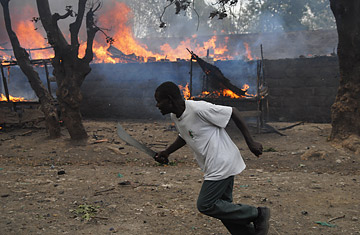
The ICC is pushing to bring to justice those responsible for the post-election violence in Kenya.
Kenyans have rarely been disappointed in the ability of their political leaders to be disappointing. So it's not all that surprising that little has been done for the past two years to hunt down those responsible for the ethnic violence that wracked the country following the December 2007 presidential election, killing 1,100 people. In fact, Kenya's leaders have spent more time in recent months discussing whether they should comply with orders to turn in their gas-guzzling government-issued Mercedes Benzes for more fuel-efficient Volkswagen Passats and the shocking — by Kenyan standards — news that two Kenyan men had gotten married in Britain in October.
On Thursday, however, Kenya's leaders could no longer avoid dealing with the situation: the chief prosecutor of the International Criminal Court (ICC) announced he will open a formal investigation into the post-election violence, saying there is sufficient evidence to suggest that those behind the bloodshed committed crimes against humanity. Luis Moreno-Ocampo said he hopes the investigation could begin in December. Those suspected of orchestrating the attacks that the Kikuyu and Luo tribes launched on one another could be arrested and transferred to the ICC in The Hague to stand trial.
Moreno-Ocampo's decision to intervene is a sign of just how badly country's political class has faltered in the two years since the election. For months, the various factions in the bloated coalition government have squabbled over how to pursue those involved in the violence. And on Thursday, President Mwai Kibaki and Prime Minister Raila Odinga stood by Moreno-Ocampo's side, watching silently as it took an outsider to finally start the justice process moving. If the two leaders had acknowledged the truth — that Kenya is too politically paralyzed to handle an investigation — and asked the prosecutor to take over from the beginning, Moreno-Ocampo could have begun his work immediately. Instead, they've resorted to stall tactics and made uninspired offers of cooperation since the ICC said it would get involved. "We are ready to work with his court so that we don't see a repeat of what we saw last year," Odinga said blandly.
Kibaki and Odinga faced each other in the fateful December 2007 election that sparked the riots. Kibaki won the election but subsequent allegations of vote rigging led to clashes between Kibaki's tribe, the Kikuyu, and Odinga's tribe, the Luo. The government and the media initially portrayed the violence as spontaneous outbursts of rage, but the two sides soon started pointing fingers of blame at each other's political leaders, alleging that the attacks had been orchestrated to exploit tensions between Kenya's 42 tribes as a way of settling scores and jockeying for advantage in the new government.
Mediation by former U.N. Secretary-General Kofi Annan ended the violence. Months later, in October 2008, a Kenyan commission investigated the attacks and gave Annan an envelope containing the names of several of the top suspects. Once it became clear earlier this year that Kenya would not go after the suspects itself, Annan turned the envelope over to Moreno-Ocampo. Tensions have simmered since then — partially because the government has never dealt with the suspects or helped the tribes to reconcile their differences.
A Truth, Justice and Reconciliation Commission, announced with much fanfare three months ago, disclosed Thursday that it had not received any government funding to start its work. And earlier in 2009, the Kenyan parliament rejected a bill that would have created a special tribunal to try the suspects. Lawmakers said it could have been subject to political pressure, but many Kenyans saw it as a classic dodge to avoid responsibility.
Human rights activists say it would have been political suicide for Odinga and Kibaki to refer Kenyans to the ICC themselves. "Any referral by Kenya would have been a de facto admission that Kenya is unable to prosecute the perpetrators, and that would have put us under the umbrella of failed states," Hassan Omar Hassan, head of the Kenya National Commission on Human Rights, tells TIME. "So the President and the Prime Minister wanted to save themselves from embarrassment in that regard."
That seems to be how it's gone for Kenya, which is gaining a reputation, even among other African nations, as a political basket case where violence is only waiting for the next election to break out again. Leaders have consistently chosen to look after themselves and protect their own rather than trying to get to the bottom of the post-election turmoil and iron out differences between the country's ethnic groups.
Now activists fear that Kenya's leaders might revive plans for a local tribunal in a further bid to make sure the envelope's contents never become known. That could gum the works for the ICC, which can only intervene when a country's own judicial system isn't up to the task. "Odinga and Kibaki might end up supporting a tribunal as a fallback strategy," says Hassan. "Of course, the Kenyan public still has very little faith in the local process at all."
